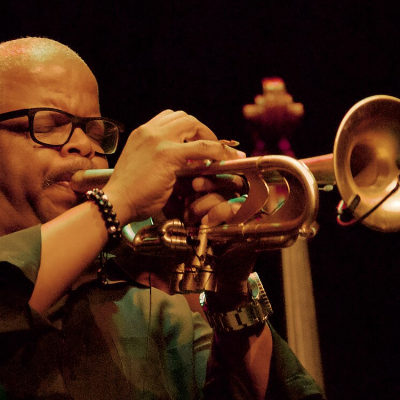“Plainsong,” a story by Joyce Becker Lee, was a finalist in our recently concluded 47th Short Fiction Contest. It is published with the permission of the author.
Plainsong
by Joyce Becker Lee
_____
Tansy steps up to the microphone, and the world shifts into slow motion. Behind her, the band pulsates, big brass, booming beat, and howling saxophones like foreplay. Before her, the shadowy movement of caliginous figures, backlit to opacity, a murky mob breathing as though one, daring her to entertain with the melodies stored in her throat and heart, perversely seeking the pleasure to be derived from her anticipated failure to enthrall.
The mike’s silver orb becomes her focus, its aura a tight dome that pulls at her breath, sucking the notes from her depths, the rushing air inverting her diaphragm and drawing the sound up, up, to swirl around cranial cavities and burst forth through teeth and lips, an ethereal sound alternately eructing and crooning, spewing words and caressing tones. Her throaty growl transforms static notes into plaintive mating moans, black-widow sex-cries that end with an ecstatic, satiated death.
The audience reacts with an awed hush as her melodies tease and torment their ears, song after song, notes of pain and despair and rapture, the sounds of centuries wrenching from each listener a personal purification, delving into emotions unrealized and unexplainable. It’s more than music: it’s an exorcism, a purging, a catharsis. Tansy is more than a singer: she’s a gypsy, an oracle, a prophet.
There is no patter between songs. She has nothing trivial to say and they don’t expect it; talk is not what they came for. Tansy lets the songs flow, one into the other, building and probing, presenting a conjectural picture of the artist, the illusion of a life beyond the songs, a peek into her depths, without a word of explanation or apology.
The spell continues, song after song, for just over an hour. Then, as her last blue notes hang, achromatizing into the air, the listeners erupt, salvos of cheers washing over her, to shake her out of her sonant trance.
With a tiny tremor, Tansy awakens from her catalepsy and manages a smile in acknowledgement of the adulation being heaped upon her. She is exhausted, her breath, now freed from the demands of pitch, coming fast as though to catch up to the melodies that have escaped. She stretches an arm to acknowledge the musicians behind her, then waves to the still-cheering masses and, weaving slightly, makes her way backstage where her assistant, Petey, stands ready with a glass of water and a towel, which he tosses around her sweat-drenched neck.
The theater manager appears from the shadows.
“How about an encore, Tansy?”
She shakes her head and manages a wry grin. “Leave ‘em wanting more, right?” At his scowl, she pats his cheek. “I’m sorry, Grant, I’m wiped. You want me good in the second show, don’t you?” There’s enough magic left in her aura to soothe his avidity.
Back in her dressing room, she wriggles out of the heavy, sequined gown and hands it to Petey to air out, then envelops herself into a soft robe and collapses into a chair before the mirror. The music continues in her head; it’s never completely gone, drumbeats connecting the synapses between neurons, dendrites transmitting weird harmonies throughout her brain.
“You were spectacular tonight, Babe,” Petey says, moving behind her to loosen her ebony hair and gently brush out the spray and product as she watches in the mirror. She is alarmed at the faint streaks of silver.
“I was short,” she says. “Grant wanted me to do an encore.”
“You were fine,” Petey assures her. “An hour is enough. No cabaret singer does more. And you don’t take an intermission.”
“I want to give them their money’s worth.”
Petey snorts. “Most come just to say they’ve been here,” he snarls. “Rich folks who want to feel connected to their roots. Who want to feel the pain of poverty and abuse without the actual pain. The ones who really appreciate your music can’t afford your shows.”
He’s right, and she knows it, but the comment is unnerving. The music in her head slows down, becomes Gospel, filling her spaces, drawing her up and pulling her down at the same time.
It is interrupted by Dexter, who comes swooping in, his huge bulk filling the room, his bravado sucking the oxygen out.
“Well, Dexter the Ex-ter,” Petey simpers, eyeing the big man appreciatively.
The hulk doesn’t miss a beat. “Petey the Sweetie,” he retorts. “Get me a beer, will you, doll baby?”
Petey catches Tansy’s eye and she nods, so with an audible huff he heads out to the lounge. As she turns to her soon-to-be-ex-husband, her tempo picks up to match her pulse. Damn, the man could still rattle her.
“What do you want, Dex?”
The big man’s face turns serious. “I’m still your husband, Tansy.”
“Not for long. Your decision.”
“. . . and we still have a daughter together. And she’s in trouble.”
Tansy turns, alarmed. “What do you mean? What kind of trouble?”
Dexter starts to pace, his face twisted in pain. “Drugs. Our baby’s doin’ drugs.”
Tansy relaxes. The music slows. “That’s it? A little pot? She’s sixteen, Dex. Didn’t you try it when you were a kid? Hell, don’t you do it now?”
He stops pacing and glares at her. “I found needles.”
Tansy’s blood chills, turning her limbs to ice. The music grows louder, off-key. She can’t think, can’t speak through the cacophony.
“I found the shit in her room.”
The noise builds, drowning out all thought. She lands on an idea. “I’ll talk to her.”
“Hell, you think that’ll stop her? She’s a junkie!”
“Where is she now? You didn’t leave her alone?”
“She’s in the car, out cold. Marvin’s with her. I just stopped to tell you I’m checking her into rehab. Now.”
“Wait, I’ll go with you.”
His laugh comes out a snort. “Like hell you will. You got a second show to do. You never cut a show for anything. Don’t worry. She won’t even notice you’re not there.” The lowest blow, but she ignores the barb, focusing on the words second show. The music swells.
“She’ll fight you.”
“Hell, I’ll tie her down and sit on her if I have to.”
She nods. “Call me later. I’ll go see her tomorrow.”
He hesitates, a sharp retort at his tongue, but he swallows it. She sees the hesitation, knows without knowing what he is thinking as he turns to go. Cold, unfeeling. The words he said in the lawyer’s office. He doesn’t understand all the heat she expends in her music, how it drains, exhausts her
“We all got our drugs!” she yells after him.
His big back stiffens, and for a moment she wants to reach out to touch him, to hold him, to be the family he wanted. But she doesn’t, and without turning, he slams out.
The music crescendos, overpowering, and she sinks down into a chair as Petey comes back in.
“You okay? You want this?” he asks, indicating the beer in his hand.
Tansy shakes her head no. She is already running through her set in her mind, analyzing melodies, changing phrasing. She signals Petey to come help with her hair.
We all got our drugs.
Second show, she’ll give them an encore.
_____

Joyce Becker Lee earned her MFA from Northwestern University, Prior to that, she taught English and Theater and worked in a variety of writing-based jobs, including reporter, theater columnist, editor and textbook developer. Her award-winning stories, features, and poetry have been published throughout the U.S. and Canada, and online. She has also worked in community and professional theater and opera as a director, singer and actor, and has written and produced ten children’s plays and musicals.



































beautifully expressed….good read…..
Bravo! Enjoyable, well crafted writing!
I enjoyed this story. It held my attention and made me want more. Great read!
I love the read. Well versed. It held my interest and I wanted more. Great work cuz!!
Beautiful, poignant and deep. Very poetic writing that truly tells a story of the inner experience. Want to read more…